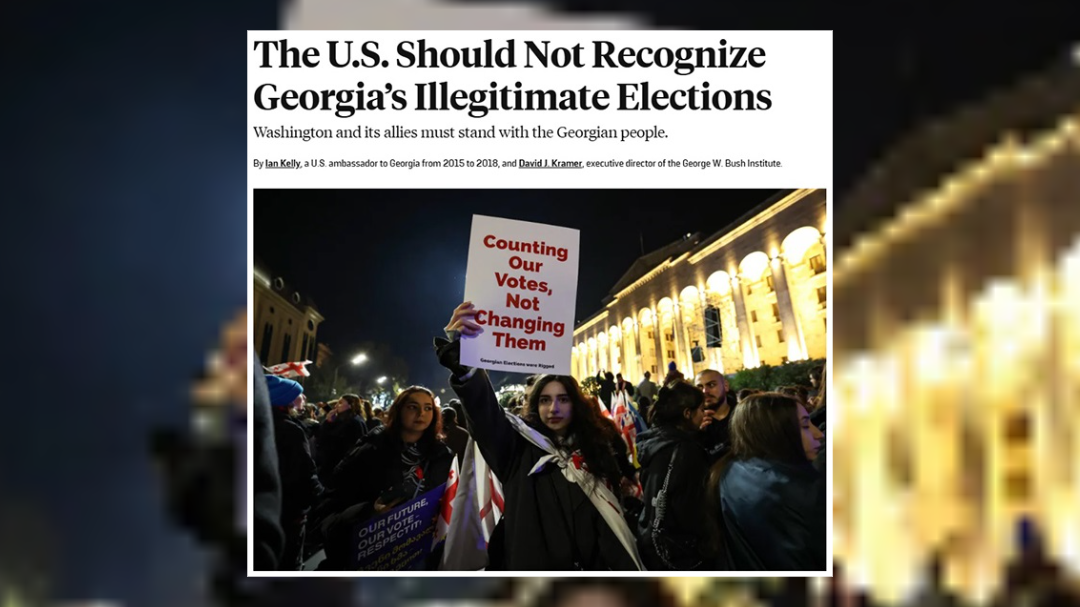Ian Kelly, the U.S. Ambassador to Georgia from 2015 to 2018, and David Kramer, the Executive Director of the George W. Bush Institute, published a joint critical letter in Foreign Policy regarding the parliamentary elections held in Georgia. In their letter, they called on the U.S. to support the pro-Western Georgian people and to recognize the elections as illegitimate.
News
Politicians are criticizing U.S. Secretary of State Antony Blinken for saying nothing about the illegitimacy of the election results in his announcement and for avoiding criticism of Georgian Dream. Blinken is being urged to be as forceful as Secretary of State Colin Powell was in his 2004 speech about Yanukovych's "election theft" in Ukraine, which led to the Orange Revolution.
"Citing international observers, Blinken’s statement said that the election was not “free and fair,” but he avoided commenting on the legitimacy of the results themselves. Though Blinken encouraged Georgia’s political leaders to “respect the rule of law” and address any electoral deficiencies, he did not name Georgian Dream, which, as the country’s ruling party, created this mess in the first place," the letter said.
Kelly and Kramer are calling on President Joe Biden's administration to sanction those responsible for the crisis in Georgia, starting with the leader of the Georgian Dream party, oligarch Bidzina Ivanishvili, and the Prime Minister of Georgia, Irakli Kobakhidze, as well as members of the Central Election Commission of Georgia.
Politicians are also discussing a statement from Bidzina Ivanishvili, in which he accuses opposition parties of attempting to drag the country into war at the behest of Western partners. The authors of the letter describe the pre-election propaganda from Georgian Dream about a "second front" as absurd.
"No one should be surprised that Georgian Dream would make efforts to steal the election. This spring, Ivanishvili suggested that, in the event the party didn’t win, the opposition would drag the country into a devastating war with Russia. He made the absurd claim that the opposition was in thrall to its Western “patrons,” who had ordered them to ensure Georgia opened a “second front” against Russia. In August, Ivanishvili promised to make these opposition parties “pay for all the crimes against the Georgian people” by outlawing them," write Kelly and Kramer.
They accuse Bidzina Ivanishvili's party of establishing a one-party rule in Georgia, which it has been implementing step by step since 2012. They note that after gaining control over parliament and the judiciary, Georgian Dream has attempted to assert control over two components that resisted government oversight - having twice attempted to impeach President Zourabchvili and dismantling monitoring groups and non-governmental organizations.
The government has proposed a Russian-style law on foreign agents, which would require organizations receiving foreign funding to register as "agents of foreign influence." Fearing that Tbilisi might use this law to marginalize and ultimately shut down civil society groups and independent media, hundreds of thousands of Georgians took to the streets to protest. The government responded with a brutal crackdown on peaceful demonstrations," the authors of the letter state, emphasizing the need to explore effective alternatives beyond the sanctions imposed by the Russian law, as the suspension of financial aid to the government has not impacted Ivanishvili and Kobakhidze.
Kelly and Kramer call on Washington, alongside Germany and Poland, to stand by the Georgian people, who "remain very pro-West and are eager to join NATO and the EU," and not to recognize the illegitimate elections.
"Georgia has become the latest battleground, and it’s time for the United States to rise to the challenge," write Ian Kelly and David Kramer.
To protect the votes, a large rally was held on October 28 in Rustaveli, called by the President of Georgia and opposition parties. Salome Zourabichvili labeled the elections a "Russian special operation." The Central Election Commission's results, which claim that Georgian Dream won with 53.92% of the votes, are not recognized by the opposition parties that have crossed the electoral threshold.















